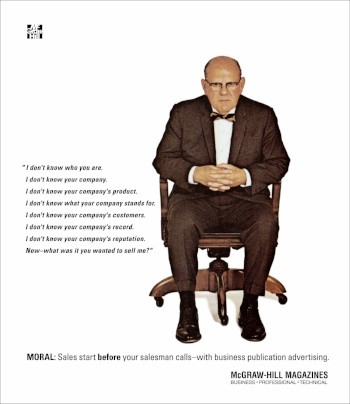
With all the talk about privacy concerns and online social networks, what often gets lost is the valuable role that networks play in building trust with customers.
When I first published this article in January 2012, I focused primarily on how business blogging helps build those relationships. In this update, I also want to call attention to LinkedIn.
Let's Start with Building Trust
Building trust with customers may be one of the most critical aspects of business. Not just in the traditional or in-real-life sense where you develop relationships through in person interactions, on the phone and via written communications, but also online where more and more prospects begin the purchase process. It's a really big deal, especially when you place yourself in your customers' shoes and think about the potential risk being taken in doing business with an unknown entity...
This is a point that I introduced in TalkFloor Interview #5 about Building Trust with Customers Online.
McGraw-Hill Understood This
The McGraw-Hill ad you see at the top of this article describes the situation perfectly.
Although more than 50 years old and developed as a reason to advertise in business publications, it succinctly captures why you need to connect with your prospects and develop the basis for a relationship. It addresses the objections many customers express to cold calls.
More specifically, it states:
- I don’t know who you are.
- I don’t know your company.
- I don't know your company’s product.
- I don’t know what your company stands for.
- I don’t know your company’s customers.
- I don’t know your company’s record.
- I don’t know your company’s reputation.
The last line reads: "Now, what was it you wanted to sell me?"
Ultimately, the message is that selling starts before the sale (and the salesperson calls).
B2B Marketing Hasn't Changed: Build Trust Using LinkedIn!
Okay, so that ad is from a different time and place. Right? No. It's still true. You still need to connect with prospects before you try to sell them something. You can't be an unknown entity to do business with them.
Although in-person connections remain important, digital social networks that are available 24-7 are even more important because they are convenient to your prospects, they educate on their terms and they represent a track record of what to expect from you.
Take LinkedIn. It details your professional experience, connects you to those you've met along the way in your jobs, at events you've attended, and as a result of networking. It also connects you to your places of employment.
For someone who knows nothing about you, discovering your background on LinkedIn offers information, peace-of-mind that you are legitimate, and possibilities for common interests and experiences. It offers the first step to developing trust.
That said, this 2:03 minute video titled B2B marketing fundamentals don't change represents a modern-day interpretation of that McGraw-Hill advertisement above, and it truly captures why all of this social networking online stuff matters in business.
[Note: I first brought up the McGraw-Hill ad in Digital Visibility: The Reason Behind Content Marketing. Image courtesy of McGraw-Hill.]
Three Other Expert Perspectives on Creating Trust with Customers
Building trust with customers - as both interpretations of the McGraw-Hill advertisement illustrate - begins before a customer signs on the dotted line to buy something from you.
Building trust doesn't happen overnight. Rather it builds up over time as a result of the actions you, your people and your organization take not only IRL [in real life], but also online and via social networks.
Building trust is a critical aspect of doing business when you consider how much distrust exists in prospects' minds. It's not something to be passive about.
Why then aren't more companies engaging with customers online, building relationships and taking every opportunity to establish trust even on digital social networks? Is it that it's not important enough, or that it's frivolous and a waste-of-time?
While pondering this topic, I came across three expert perspectives:
- Robert Hurley, professor at Fordham University and author of the book "The Decision to Trust: How Leaders Can Create High Trust Companies"
- B.L. Ochman, author of the What's Next Blog about Internet Marketing Strategy, social media trends, news and community, and contributor to Digital Next, AdAge, Mashable, Business Week and others
Robert Hurley: Trust is Good for Companies, Too
Robert Hurley's Wall Steet Journal article titled "Trust Me" explains that "the most-trusted companies have lower employee turnover, higher revenue, profitability and share-holder returns..."
He offers five principles for demonstrating trustworthiness, all of which translate into reasons for companies to be active online and via social networks:
- Show that you share the same interests
- Demonstrate concern for others
- Deliver on your promises
- Be consistent and honest
- Communicate frequently, clearly and openly
BL Ochman: Blogging Establishes Trust
BL Ochman describes these seven reasons why your company should be blogging.- Humanize your brand
- Establish Trust
- Generate Leads
- Communicate frequently with your audience
- Be recognized as an authority and source of exclusive news
- Crisis Communications
- Because blogging is fun! [yes, it is :-)]
Ted Rubin: Measure Return on Relationship
Ted Rubin describes "Return on Relationship" as the New Measure of Success.
Here are the recommendations he made during his presentation at the United Insight Contagious Content conference in June 2011 while describing ROR:
- Listen
- Make it about them
- Ask 'how can I serve you?'
- Aim for ongoing engagement
- Know the people in your audience

How Are You Using Digital Networks to Build Trust With Your Customers?
What's your take on this topic? What works best in person and how do you use digital networks to support your reputation with prospects? Does LinkedIn play a role or have you found other networks that are more effective for your business?
Thanks for reading!








